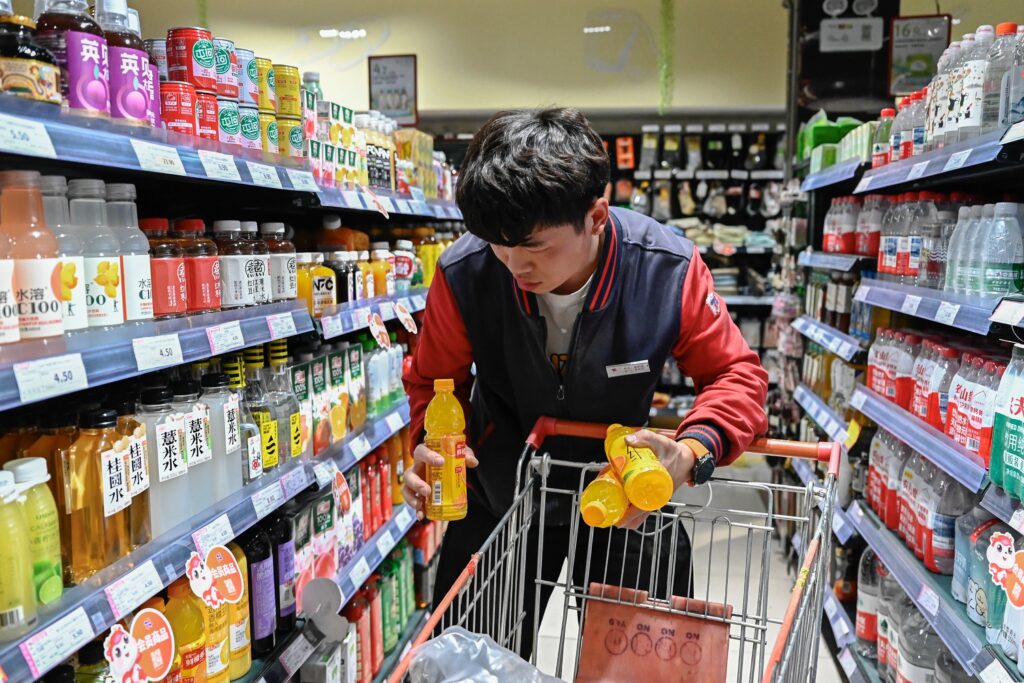China told Washington on Wednesday to “stop threatening and blackmailing” after US President Donald Trump said it was up to Beijing to come to the negotiating table to discuss ending their trade war.Trump has slapped new tariffs on friend and foe alike but has reserved his heaviest blows for China, with new levies of up to 145 percent on many Chinese imports even as Beijing has retaliated with duties on US goods of 125 percent.”If the US really wants to resolve the issue through dialogue and negotiation, it should stop exerting extreme pressure, stop threatening and blackmailing, and talk to China on the basis of equality, respect and mutual benefit,” Foreign Ministry spokesman Lin Jian said.”China’s position has been very clear. There is no winner in a tariff war or a trade war,” Lin said, adding: “China does not want to fight, but it is not afraid to fight.”Trump’s new levies mean that the tariffs on certain Chinese goods are as high as 245 percent, which the White House said in a factsheet on Tuesday were “as a result of its retaliatory actions”.Beijing’s commerce ministry said in a statement later on Wednesday it had “noted that the cumulative tariffs on some individual Chinese exports to the US have reached 245 percent under various designations”, without detailing the scope of the products affected.”The United States has instrumentalized and weaponized tariffs to a completely irrational level,” the ministry said, adding that China would “ignore the US’s utterly meaningless tariff numbers game”.The Republican initially imposed 20 percent tariffs on imports from China over its alleged role in the fentanyl supply chain, on top of duties from previous administrations, then added 125 percent over trade practices that Washington deems unfair.His administration has, however, given temporary reprieve for certain tech products such as smartphones and laptops. The White House said on Tuesday it was up to Beijing to make the first move towards ending the dispute, which economists warn could cause a global recession.”The ball is in China’s court. China needs to make a deal with us. We don’t have to make a deal with them,” said a statement from Trump read out by Press Secretary Karoline Leavitt.- China growth -China said on Wednesday its economy grew a forecast-beating 5.4 percent in the first quarter as exporters rushed to get goods out of factory gates ahead of the US levies.”The escalation happening in April is going to be felt in the second-quarter figures as the tariffs will send stateside firms looking to other suppliers, impeding Chinese exports and slamming the brakes on investment,” Heron Lim from Moody’s Analytics told AFP.Japan’s envoy for talks slated for Wednesday in Washington said he was optimistic of a “win-win” outcome for both countries.Ryosei Akazawa, who was due to meet US Treasury Secretary Scott Bessent, said he would “protect our national interest”.Carmaker Honda said on Wednesday it will shift production of its hybrid Civic model from Japan to the United States, although that represents a very small part of its global output.The rationale behind the decision “is not a single issue”, a spokesman for the Japanese firm said. “The decision is based on the company’s policy since its foundation that we produce cars where the demand is.”South Korea, another major exporter in particular of semiconductors and cars, said Finance Minister Choi Sang-mok would meet Bessent next week.”The current priority is to use negotiations… to delay the imposition of reciprocal tariffs as much as possible and to minimise uncertainty for Korean companies operating not only in the US but also in global markets,” Choi said on Tuesday.Trump has imposed the steep duties on imports from China since the start of the year, alongside his 10 percent “baseline” tariff on many US trading partners.His administration recently widened its exemptions from those tariffs, excluding certain tech products like smartphones and laptops from the global 10 percent tariff and the 125 percent levy on China.Chip stocks across Asia slumped after Nvidia said it expects a $5.5 billion hit due to a new US licensing requirement on the primary chip it can legally sell in China.Trump also ordered a probe on Tuesday that may result in tariffs on critical minerals, rare-earth metals and associated products such as smartphones.burs-mjw/pbt
Wed, 16 Apr 2025 13:44:32 GMT
